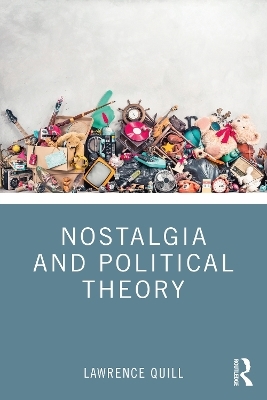
Nostalgia and Political Theory
Seiten
2024
Routledge (Verlag)
978-1-032-27453-9 (ISBN)
Routledge (Verlag)
978-1-032-27453-9 (ISBN)
Nostalgia and Political Theory advocates the central importance of nostalgia as a theoretical response to the ‘historic’ past and a vertiginous present. Detailed analyses of diverse theoretical approaches reassess the relation between nostalgia and politics.
In Nostalgia and Political Theory, Lawrence Quill advocates the central importance of nostalgia as a theoretical response to the ‘historic’ past and a vertiginous present. He does so by offering detailed analyses of diverse theoretical approaches, from the ancient world to the modern day, in order to reassess the relation between nostalgia and politics. Quill proposes nostalgia as an organizing concept, silently (and not so silently) influencing theorists as they construct critiques of the present or visions of the political future.
Nostalgia and Political Theory surveys key contributions to nostalgic and antinostalgic thinking from across the political spectrum. Assessing the influence of photography, radio, television, and personal computing on changing conceptions of the past, Quill also considers the relation between populism, nationalism, and nostalgia. By challenging those who would dismiss nostalgia as irrational or a symptom of cultural malaise, Quill concludes by advancing the case for a liberal theory of nostalgia.
Nostalgia and Political Theory will be of interest to scholars and students in the fields of political theory, social theory, sociology, philosophy, political science, memory studies, and nostalgia studies.
In Nostalgia and Political Theory, Lawrence Quill advocates the central importance of nostalgia as a theoretical response to the ‘historic’ past and a vertiginous present. He does so by offering detailed analyses of diverse theoretical approaches, from the ancient world to the modern day, in order to reassess the relation between nostalgia and politics. Quill proposes nostalgia as an organizing concept, silently (and not so silently) influencing theorists as they construct critiques of the present or visions of the political future.
Nostalgia and Political Theory surveys key contributions to nostalgic and antinostalgic thinking from across the political spectrum. Assessing the influence of photography, radio, television, and personal computing on changing conceptions of the past, Quill also considers the relation between populism, nationalism, and nostalgia. By challenging those who would dismiss nostalgia as irrational or a symptom of cultural malaise, Quill concludes by advancing the case for a liberal theory of nostalgia.
Nostalgia and Political Theory will be of interest to scholars and students in the fields of political theory, social theory, sociology, philosophy, political science, memory studies, and nostalgia studies.
Lawrence Quill is Professor of Political Science at San José State University in California, where he teaches political theory. A Visiting Fellow at Cambridge University’s Center for Research in the Arts, Social Sciences, and Humanities (CRASSH), his current research focuses on technology and politics.
Preface
Introduction
1 Pre-modernity and Nostalgia
2 An Emotional Contract
3 Inventing the Past
4 Nostalgia and Exile
5 Mediating Nostalgia
6 Consuming Nostalgia
7 Populism and Nostalgia
Conclusion
Index
| Erscheinungsdatum | 02.02.2024 |
|---|---|
| Verlagsort | London |
| Sprache | englisch |
| Maße | 152 x 229 mm |
| Gewicht | 294 g |
| Themenwelt | Geisteswissenschaften ► Philosophie |
| Geisteswissenschaften ► Psychologie ► Allgemeine Psychologie | |
| Geisteswissenschaften ► Psychologie ► Sozialpsychologie | |
| ISBN-10 | 1-032-27453-0 / 1032274530 |
| ISBN-13 | 978-1-032-27453-9 / 9781032274539 |
| Zustand | Neuware |
| Informationen gemäß Produktsicherheitsverordnung (GPSR) | |
| Haben Sie eine Frage zum Produkt? |
Mehr entdecken
aus dem Bereich
aus dem Bereich
Techniken der Verhaltenstherapie
Buch (2024)
Julius Beltz GmbH & Co. KG (Verlag)
35,00 €


